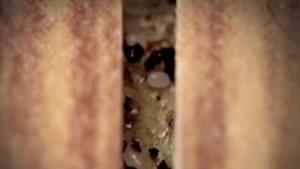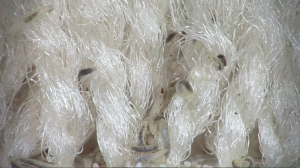Flea season is here! ....well, not really. In Los Angeles we really don't have a flea season per se, because we really don't have seasons. Our beautiful year-round weather keeps it warm enough all year round for fleas to thrive. Frost, ice and snow never kill our flea populations.
So what makes these tiny critters such a pain? Well first, they are survivors. Although they die if they don't eat a blood meal for 24 hours, a single flea will typically bite their host 300-400 times a day, ingesting 15 times their body weight in blood each day! And an adult female flea delivers her own body weight in flea eggs each day.
Flea eggs are not sticky, like many other parasite eggs. This means that any eggs laid on Fluffy turn her into a little salt shaker as she deposits flea eggs where ever she goes - between floor boards, at the base of carpets, bedding and furniture. The eggs are very happy to hang out and wait many weeks, even months, for the right environmental conditions to make their debut. Shadows and changes in light, warm temperatures, humidity, vibration and increased levels of carbon dioxide (ie. a panting dog) encourage the eggs to hatch. Look closely and you will see flea eggs, larvae and pupae in the cracks of hardwood floors and at the base of carpeting:
When fleas hatch, they jump right back onto Fluffy (if she is not protected), help themselves to a blood meal and then cause an infestation all over again. Because the Los Angeles weather is always conducive to flea hatchings, it is really important that your pet is protected against fleas all year round. Many a veterinary dermatologist will say that "if you see a flea, you've already got an infestation".
Completely addressing the flea problem in your home will often require treating not only ALL the pets in the home, but also the environment - remember that 95% of the flea population (eggs, larvae, pupae) lives in the environment and only 5% of the population (adults) lives on the animal(s). Preventing the problem from ever occurring in the first place is easier and much less expensive. Just remember to consult with a veterinarian to chat about your pet's lifestyle and to choose the most appropriate flea prevention for him/her. Also be sure to stick to high-quality products. Cheaper, grocery store products are not only less effective, but they can sometimes cause serious problems.
"I don't like putting chemicals on my pet, so I only use flea control when I see fleas." Consider this: apart from a flea infestation, there are some other complications that fleas can bring. Flea bite allergies (super itchy skin which can become infected and then even more itchy), tapeworms (those gross little rice kernel-type worms that hang out by the bum) and Bartonellosis (the organism associated with cat-scratch disease in humans) are some "extra perks" that fleas can bring.
A quick word on more "natural" products. While some have noticed things like garlic, brewer's yeast, citrus fruit rinds and vinegar to help discourage fleas on pets, there is no clinical evidence that these have any real effect. Diatomaceous earth and boric acid found in Borax and other powders, dehydrate the larvae that are found in the carpet, pet bedding and other places in flea-infested environments. These work best when applied to the locations in which the pet frequently sleeps.
"But my pet never goes outside". Ah, the standard reply from owners to explain why they do not use flea control on their pets. Remember that fleas thrive in indoor environments and all it takes is one male and one female flea to be introduced, perhaps as a hitchhiker on a pant leg, shoe string or visiting pet, to start an infestation. Within weeks, two fleas can become two thousand fleas inside the home.
Contact DTLAvets today and schedule an appointment to create a flea prevention program just for your pet!

